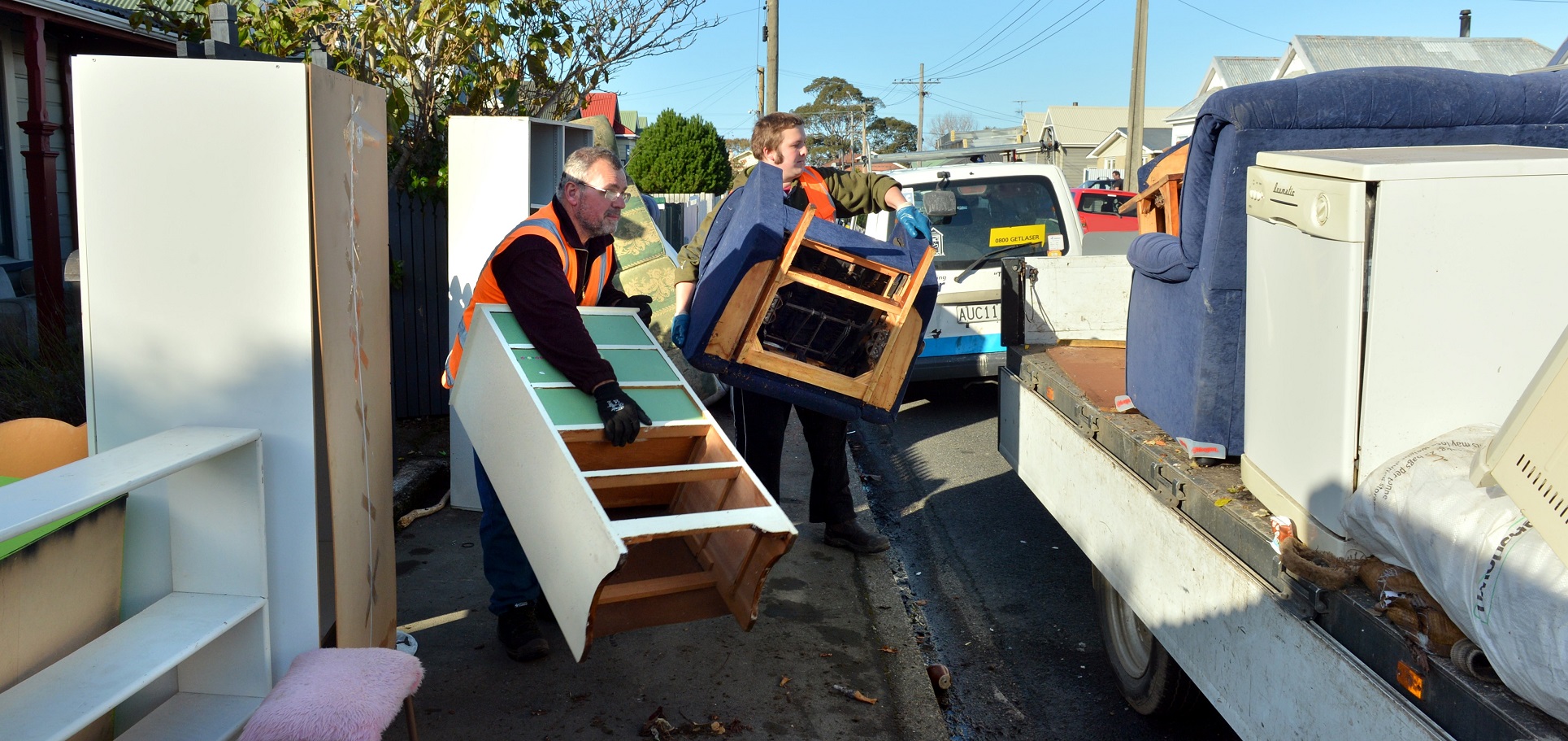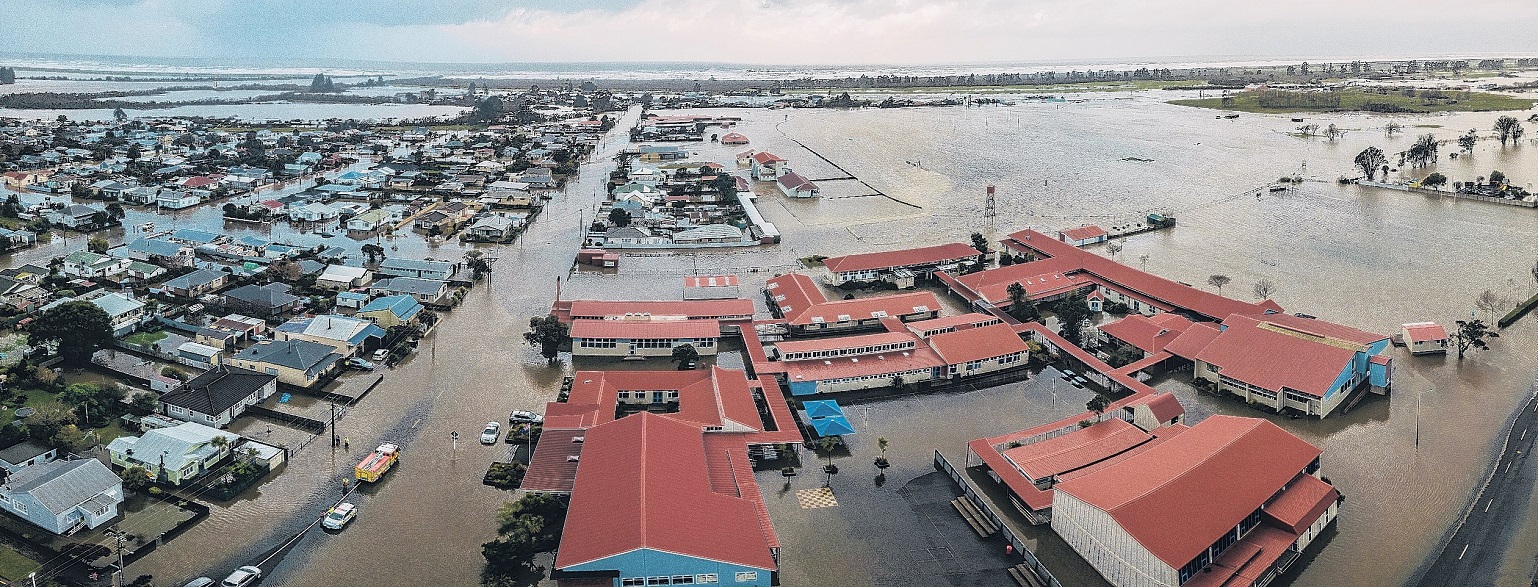
Avoiding harm in South Dunedin is going to be costly.
But so far, Wellington has not been prepared to write any cheques.
Hopes central government might back a $132 million plan to start buying flood-threatened homes before inexorable sea-level rise makes them unliveable have been dashed — so far.
There’s often a suspicion in Labour voting Dunedin that National-led governments don’t see much mileage in spending money in the town. However, the lack of success here might be bigger even than politics.
Longtime public policy researcher and now emeritus professor at Te Herenga Waka Victoria University of Wellington, Jonathan Boston, thinks he knows why Ōtepoti might have been talking to the hand.
"I think it reflects the fact that the government realises that you couldn’t have a special scheme for South Dunedin because South Dunedin is not unique.
"There are going to be lots of South Dunedins, albeit often on a smaller scale, over the coming decades, and when you start thinking about the magnitude of that, you realise you’re going to be talking billions of dollars, not just a few tens of millions of dollars a year, so the costs loom very large if you start thinking about any significant form of property buyouts."
It doesn’t help that the current government appears to be short-term focused, happy to kick long-term challenges down the road, he says. And that it has emptied the coffers on tax cuts.
Short-term thinking is one of Prof Boston’s bugbears. He’s done a lot of thinking and writing about it in recent years, while simultaneously digging deep into the wicked problems associated with climate change.
His assessment of the South D dilemma is informed, significantly, by his work on the Expert Working Group on Managed Retreat (EWG), which reported back to the previous Government in August last year. It made 89 recommendations addressing the full breadth of the challenges associated with relocating communities, from the deep ties to the land of te ao Māori, to identifying who should move, to who should pay for it, who should be involved in the decisions and all the considerations around ensuring people are looked after.
Now Prof Boston has published his own take on the topic, A Radically Different World: Preparing for Climate Change. The cover notes "societies must prepare for a more perilous future".
It comes as Wellington’s lack of action on climate change adaptation is receiving renewed attention.
A new report out of the Climate Change Commission, Progress report: National Adaptation Plan — Assessing progress on the implementation and effectiveness of the Government’s first national adaptation plan, gives central government a patchy report card, identifying "significant gaps".
Among the commission’s concerns are stalled work on legislation to support managed retreat.
It may be that Parliament’s Finance and Expenditure Committee (FEC) sheds a little light on this when a cross-party inquiry on an adaptation framework reports back. But the committee recently pushed its report-back date out to October, and the Climate Change Commission did not sound like it was holding its breath.
"It remains unclear whether the adaptation framework will set out roles, responsibilities and processes to support local adaptation planning, including managed retreat," the commission says in its report.
However, the FEC inquiry has asked the big questions: "What would be a durable, affordable, and fair approach to adaptation for the existing built environment (i.e., where people live and work) in the future? How could that approach be phased in over time?"
It is looking at who pays.
Submitters to the inquiry were clear on retreat and relocation.
"A large number of submitters stated that there is an urgent need for a comprehensive adaptation system that enables retreat," they said, according to a Ministry for the Environment summary.
"Several submitters noted some disappointment that work towards a retreat system is not more advanced."

The Environmental Defence Society (EDS) has also had its oar in, recently releasing a report, Design Recommendations For A Climate Adaptation Act, calling for a Climate Change Adaptation Act that would facilitate managed retreat, and a National Adaptation Agency to oversee it. Similarly, the EWG recommended a national resilience, relocation and reconstruction agency.
Meanwhile, the South Dunedin Future project, which is leading the area’s climate change response, will next month release another report, further detailing the risks homeowners face.
It’s big important stuff, involving huge sums and life-changing impacts on significant numbers of people. We need to be on it, Prof Boston says.
"We need a comprehensive, cost-effective, fair and durable scheme for relocating potentially hundreds of thousands of people over the coming century and beyond. If we don’t have it, then we’re going to have essentially unmanaged retreat, which is going to be messy, damaging politically, socially, culturally and economically, and could well test the durability of our current political system to the limits."
We have the ninth longest coastline in the world, our average annual cost of disasters is second highest in the world as a proportion of GDP — before factoring in climate change — and we’re still building in hazard zones.
The big decisions waiting to be made will speak to who we are as a nation.
For example, the EWG on which Prof Boston worked recommended that as part of a relocation policy "people must have access to adequate and affordable places to live".
In this book, Boston argues the case for a public compensation scheme for planned relocation. Public compensation for some of the costs of all this seems unavoidable, he says. Without it, many will face financial ruin, property purgatory, bankruptcy.
But that’s just the start of the debate.
There is a whole cast of interested parties, all of whom will need to be treated fairly — homeowners obviously, but also people renting, businesses in the area, taxpayers and ratepayers.
"You also have different principles of fairness," Prof Boston says.
"You’ve got, for example, the principle of need, that we should seek to ensure that everyone can meet their basic needs. Well, housing is one of their basic needs. And if you place significant weight on the need for people to be housed, then one of the implications of that is that we’re going to probably have a somewhat different attitude towards whether residential property owners should be compensated vis-a-vis, for example, commercial property owners."
But if you are moving a whole town, such as Westport, or a big community, such as South Dunedin, you can’t just move the houses, he says.
"You have to bear in mind the hundreds and hundreds of businesses that are affected there, along with all manner of services, schools and what have you. So there’s all manner of kinds of things that are going to impact from the point of view of justice."
As far as homes go, the EWG found compensation should either be limited to principal places of residence, your home, or more generous compensation should be provided for your home base — as opposed to second and third houses.
But they also decided that there is a case on grounds of fairness for capping the total amount of compensation per property.
"For example, suppose the principal place of residence that’s at risk from sea level rise was worth $5m or $10m. We said that we didn’t think it would be fair to taxpayers or ratepayers, or some combination of taxpayers and ratepayers, to be fully compensating the owners of multi-million dollar properties."
So, if there’s a cap, where should it be set?
"You don’t want to have a situation in which the cap is so low that most mortgage holders are left high and dry and in significant debt. On the other hand, you don’t want to have such a generous scheme that many, many members of the community would regard it as unfair, particularly in a context where more than 40% of the population are renting and don’t own their own property."
The key point, he says, is that we need a proper national discussion about the principles that need to be taken into account in designing any relocation process and compensation scheme.
"It may be that the Finance and Expenditure Committee, in its report ... will facilitate the beginning of such a conversation, but maybe it won’t. If it doesn’t, then others will have to try to get that conversation under way."
Prof Boston says the government appears little interested in encouraging a national conversation about funding relocation.

"The government would have 60 working days to present a response to Parliament indicating what action it is taking, or plans to take, in response to any recommendations," he says.
Among other things, Prof Boston says should be part of the conversation, is the polluter pays principle.
"It’s the idea that the people who are causing harm should contribute to addressing the harm they’re causing."
Current generations, those still using fossil fuels to power their lives — and doing very little to mitigate that dependence — should contribute to the costs that will be borne by people in the future.
There’s plenty then to think about in terms of the big fairness and equity issues.
But, if anything, the issues only seem to get thornier and trickier in A Radically Different World, as Prof Boston gets further into the devilish detail of planned relocation.
For example, insurance is already part of the debate around planned relocation as premiums spike in low-lying areas and insurance companies begin their own retreat from exposed locations. Insurers are about risk, they have no interest in meeting the costs of the dead-set certainty of sea-level rise.
"There’s a multiplicity of policies that have to be carefully integrated if we’re to have a systematic, cohesive response to the increased natural hazard risk that we face," Prof Boston says. "And that includes a new planning framework, a proper system of risk assessment and analysis, a funding framework that provides assistance to enable relocation to occur, but also some changes in relation to residential property insurance to ensure that we remain resilient in the face of increasing risk."
The doubling of insurance premiums in the past eight years or so underlines that, pricing low-income households out of the market.
"And with the impacts of climate change on the horizon, insurance costs are likely to go up further."
So, in coming decades we’ll need to both relocate properties that can’t be protected and maintain affordable, comprehensive property insurance as we do so.
It is going to be tricky. For example, if houses in South Dunedin were identified for relocation they might immediately become uninsurable, but the owners might need to go on living in them for some time, waiting to be moved and unable to sell.
Other houses in the wider area might become collateral damage, as insurers get the jitters and retreat further.
On this point, Prof Boston doesn’t have a fixed position in terms of solutions, but says some things are clear.
Alongside a cost-effective, fair, durable scheme for property relocation we’ll need to ensure people can retain insurance cover during the process.
"And if private insurers aren’t willing to do that because of the risks that have prompted the relocation, then there may need to be some public provision of insurance cover of a temporary nature during that transition period."
However difficult and expensive the solutions are, Prof Boston says the alternative of failing to act would be worse.
"If you think about what’s coming at us from the future over the coming century and beyond, with the potential for multi-metre sea-level rise, with huge disruption to every coastal community in the country, significant damage to coastal infrastructure and so on. If we don’t prepare for that and seek to mitigate the risks we’re going to face by moving people out of harm’s way, by strengthening and enhancing the resilience of infrastructure, moving infrastructure where that’s needed and so on. If we don’t do all that, then the costs to society are going to be absolutely extraordinary and you run the risk of, in effect, a breakdown of civilisation as we know it because the impacts are simply going to be so great."
Part of his concern, he says, is that too few people seem to understand what is at stake.
"People have this sense that everything is simply going to either continue on more or less as it is or there will just be gradual change.
"No. As a human species we are facing really unimaginable and unprecedented impacts that will test the adaptive capacity of the human species in an unprecedented way."
We need to grasp that, he says, and we need to use our imaginations and our innovative capacity and our capacity for planning and co-ordinating to begin to develop ways of addressing these challenges in ways that will preserve the best aspects of the civilisation that we currently have, including our democratic institutions.












